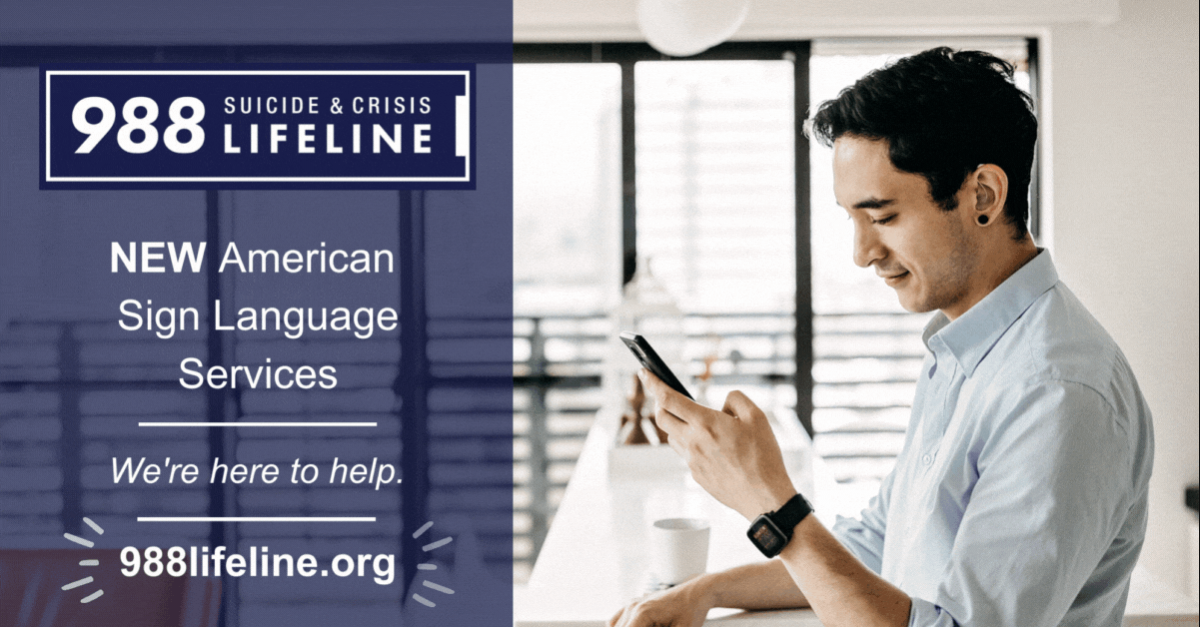988 Suicide and Crisis Lifeline - ASL Services
A man with a visible hearing aid communicating into his smartphone. A navy-blue graphic appears from the bottom left that features the 988 Suicide & Crisis Lifeline logo and reads, new American Sign Language services. We’re here to help. www.988lifeline.org
ADA - Workers With Disabilities
Census
2020 Demographic Information from the American Community Survey - Hearing Difficulties
ODHH's Online Directory of Services
Community Directory
- Mano a Mano - An organization of trilingual (Spanish-English-ASL) Interpreters
Community Organizations
| Name of Organizations |
|---|
| Cascadia Deaf Nation |
| Deaf Education Advocates Foundation |
| Deaf Bilingual Coalition - Facebook |
| Deaf Spotlight |
| Greater Seattle Club of the Deaf |
| Hearing Loss Association of Washington |
| Manos de Maiz |
| Manos de Washington - website coming soon |
| Northwest Rainbow Alliance of the Deaf - Facebook |
| Northwest Washington Community of the Deaf |
| Olympia Deaf Club (TCAD) - Facebook |
| Puget Sound Association of the Deaf |
| Three Rivers Association of the Deaf |
| Vancouver Association of the Deaf |
| Washington American Sign Language Teacher Association - Facebook |
| Washington American Sign Language Teacher Association |
| Washington Gallaudet University Alumni Association |
| Washington State Association of the Deaf |
| Washington State Deaf Senior Citizens |
| Washington School of the Deaf Alumni Association |
| Washington State Deaf Blind Citizens |
| Washington State Hands & Voices |
| Washington State Registry of Interpreters for the Deaf |
| Yakima Valley Association of the Deaf - Facebook |
Education
Family Resources
Reading with your Child
- 15 Principles for Reading to Deaf Children
- Storybook Apps
- ASL Storytime: Blackout – Washington School for the Deaf
- Welcome to Library - Educational Support Departments - California School for the Deaf (csdeagles.com)
Did you know?
Interesting Videos about Deaf Culture
Interesting Reads of ASL and Deaf Culture
- Gallaudet President Roberta Cordano navigates through both worlds
- Information about American Sign Language
- These Hands
Interesting Resources of Inclusive Public Events and Meetings
- Like the Mic: This is a video campaign launched by Rooted in Rights and the Hearing Loss Association of America (HLAA) to bring awareness that life should be accessible to everyone, regardless of their ability to hear.
- Closed Captioning: Information about the benefits and requirement of turning on closed captioning at public places.
- New Seattle Law: Seattle will require closed captioning for TVs in bars, restaurants and stadiums.
- Let's Loop Seattle: Advocacy to remove communication barriers and open doors to employment, public accommodations, state and local government services, transportation, and telecommunications.
- Text to 911: Information about the status of Text-to-911 service across Washington State
Financial & Support Resources for Individuals with Hearing Loss
Hearing Aid Resources
- Hearing Aid Buying Guide - Hearing Loss Association of America - Washington State Association
- Hearing Aids - Hearing Loss Association of America
Revised Code of Washington (RCW) and Washington Administrative Code (WAC)
- Chapter 18.35 RCW Hearing and Speech Services
- Hearing Aids Purchasers' Rights RCW 18.35.185
- Hearing aids - General - For clients twenty years of age and younger WAC 182-547-0100
Medicaid Coverage for Hearing Aids Starts January 1, 2019
Approved by the legislature last year, coverage of hearing aids for adults on Medicaid will begin January 1, 2019. The coverage limited, as it only restores coverage that existed before 2011, but it will give eligible adults some hearing aid coverage, where they have none at present. People with 45 db or more hearing loss in their better ears will be eligible for one hearing aid. This will be bundled with the hearing evaluation, ear mold and three follow-up visits to the provider. New hearing aids may be obtained every five years. Two hearing aids may be approved under certain circumstances and requires prior approval.
Cochlear Implant replacement and repair will also be covered and new CIs may be covered with prior approval. Batteries for hearing aids and CIs are not covered.
The WA Health Care Authority (HCA) is still developing the regulations for this coverage but will operate under interim "emergency" regulations until the final rules have gone through the internal review, public comment and adoption processes. HCA will have a comprehensive web site with information including Frequently Asked Questions.
Contact: Shauna Muendel, MPA, BSN, RN, ACM-RN
Email: shauna.muendel@hca.wa.gov
Summer Youth Camps & Programs Opportunities
-
Camp Taloali
-
Deaf Teen Leadership Camp
-
Gallaudet University Youth Camps
-
Hands & Voices – Camps for Deaf and Hard of Hearing Children
-
Laurent Clerc National Deaf Education Center – Info to Go
-
National Technical Institute for the Deaf - Youth Programs
-
Northwest Youth Corps
-
VISTA/CorpsThat
How to File a Discrimination Complaint
Deaf, hard of hearing and deaf-blind people often face discrimination when attempting to access employment, state/local government agencies, business, nonprofit, housing, airports, health care, mental health, education, and captioning. ODHH has prepared a listing of agencies where they can file a complaint or get help. It’s important to find out the deadline or time limit to file a specific complaint.

